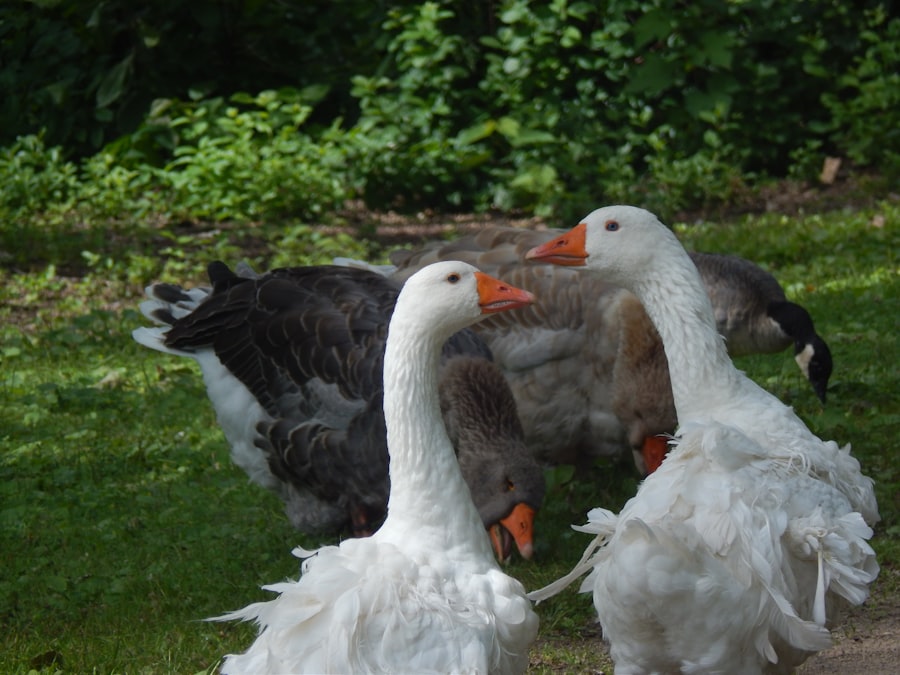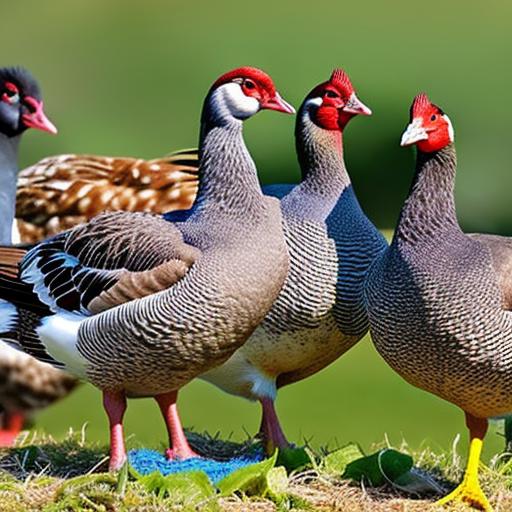Keeping geese and chickens together can be a beneficial and rewarding experience for poultry enthusiasts. Geese and chickens have different characteristics and behaviors that complement each other, making them a great combination to have in a backyard or small farm setting. In this article, we will explore the benefits of keeping geese and chickens together, as well as provide tips and insights on how to successfully integrate these two species.
Key Takeaways
- Keeping geese and chickens together can provide benefits such as pest control, fertilization, and entertainment.
- Introducing geese to an existing chicken flock should be done gradually and with supervision.
- Understanding the social hierarchy of geese and chickens can help prevent aggression and bullying.
- Providing adequate space and shelter for both species is crucial for their health and well-being.
- Feeding requirements for geese and chickens differ, and it’s important to provide appropriate food and water sources.
The Benefits of Keeping Geese and Chickens Together
One of the main benefits of keeping geese and chickens together is increased security. Geese are known for their excellent watchdog abilities and can alert the flock to potential threats such as predators or intruders. Their loud honking can act as a deterrent, keeping predators at bay and providing an extra layer of protection for the chickens. Additionally, geese have a strong instinct to protect their flock, which can help keep the chickens safe from harm.
Another benefit of keeping geese and chickens together is pest control. Geese are natural grazers and will happily munch on grass, weeds, and insects. They can help keep the grass trimmed and reduce the population of pests in the area. Chickens also contribute to pest control by eating insects, worms, and other small creatures. By combining these two species, you can create a natural pest control system that benefits both the geese and the chickens.
How to Introduce Geese to Your Existing Chicken Flock
Introducing geese to an existing chicken flock should be done gradually to minimize stress and potential conflicts. Start by placing the geese in a separate enclosure within sight of the chickens. This allows them to become familiar with each other without direct contact. After a few days, you can begin supervised introductions by allowing them to interact through a fence or mesh barrier.
It is important to provide separate feeding areas for geese and chickens during the introduction process. Geese have a tendency to be more aggressive when it comes to food, and they may try to dominate the chickens during feeding time. By providing separate feeding areas, you can ensure that each species has access to their own food without any conflicts.
Understanding the Social Hierarchy of Geese and Chickens
Geese and chickens have different social hierarchies, and understanding these dynamics is crucial for their co-existence. Geese are highly territorial and will establish a pecking order within their flock. They can be aggressive towards other geese or chickens that they perceive as a threat to their territory or resources.
Chickens also have a social hierarchy, with one dominant rooster leading the flock. However, chickens are generally less aggressive than geese and are more likely to submit to the dominance of the geese. It is important to monitor their interactions closely during the integration process and intervene if any aggression becomes excessive or harmful.
Providing Adequate Space and Shelter for Both Species
Both geese and chickens require adequate space and shelter to thrive. Geese are larger birds and need more space to roam compared to chickens. Ideally, each goose should have at least 100 square feet of outdoor space, while each chicken should have around 10 square feet. Providing enough space ensures that both species can move around freely and engage in natural behaviors.
When it comes to shelter, geese and chickens have different preferences. Geese prefer open shelters with access to water, while chickens prefer enclosed coops with nesting boxes. It is important to provide separate shelters for each species to meet their specific needs. This will also help prevent any territorial disputes between the geese and chickens over shelter space.
Feeding Requirements for Geese and Chickens

Geese and chickens have different feeding requirements, and it is important to provide for both species adequately. Geese are grazers and require access to fresh grass or pasture for grazing. They also need a balanced diet that includes grains, greens, and protein sources such as insects or commercial poultry feed.
Chickens, on the other hand, require a diet that is higher in protein. They need a balanced feed that includes grains, seeds, and insects. Additionally, chickens require access to grit, which helps them digest their food properly.
To ensure that both geese and chickens are getting the nutrition they need, it is best to provide separate feeding areas. This allows each species to eat at their own pace and ensures that they are not competing for food.
Health Considerations When Keeping Geese and Chickens Together
When keeping geese and chickens together, there are some health considerations to keep in mind. One of the main risks is the transmission of diseases between the two species. Geese are generally hardy birds and have a strong immune system, but they can still carry diseases that can be harmful to chickens.
It is important to practice good biosecurity measures to minimize the risk of disease transmission. This includes keeping the living areas clean and sanitized, providing clean water sources, and monitoring the health of both geese and chickens regularly. If any signs of illness or disease are observed, it is important to isolate the affected bird and seek veterinary care if necessary.
Nesting and Egg-Laying Habits of Geese and Chickens
Geese and chickens have different nesting and egg-laying habits. Chickens typically lay their eggs in nesting boxes within their coop. They prefer dark, quiet spaces for nesting and will often lay their eggs in the same location every day.
Geese, on the other hand, prefer to lay their eggs in open areas such as nests on the ground or in tall grass. They do not require nesting boxes like chickens do. It is important to provide suitable nesting areas for both geese and chickens to ensure that they can lay their eggs in a safe and comfortable environment.
The Importance of Regular Cleaning and Maintenance
Regular cleaning and maintenance are essential when keeping geese and chickens together. Both species produce waste that can accumulate quickly and become a breeding ground for bacteria and parasites. It is important to clean the living areas regularly, remove any soiled bedding, and provide fresh bedding for both geese and chickens.
Additionally, water sources should be cleaned and refreshed daily to prevent the growth of harmful bacteria. Regular maintenance also includes checking for any signs of wear or damage to the enclosures or shelters and repairing them promptly to ensure the safety of both geese and chickens.
Common Challenges and Solutions for Keeping Geese and Chickens Together
Keeping geese and chickens together can come with its challenges, but there are solutions to overcome them. One common challenge is aggression between geese and chickens. Geese can be territorial and may try to dominate the chickens, which can lead to injuries or stress.
To address this challenge, it is important to provide enough space for both species to establish their territories. Additionally, providing separate feeding areas can help minimize aggression during feeding time. If aggression becomes excessive or harmful, it may be necessary to separate the geese from the chickens temporarily until they can coexist peacefully.
Tips for Successful Co-Existence between Geese and Chickens
To ensure successful co-existence between geese and chickens, there are some additional tips to keep in mind. First, it is important to provide enough water sources for both species. Geese require access to water for bathing and drinking, while chickens need clean water for hydration.
Monitoring their behavior closely is also crucial. If any signs of stress or aggression are observed, it may be necessary to make adjustments to their living arrangements or provide additional resources to alleviate any conflicts.
Keeping geese and chickens together can be a rewarding experience that offers numerous benefits. By understanding their different characteristics and needs, providing adequate space and shelter, and practicing good management practices, you can create a harmonious environment for both geese and chickens. Whether you are a backyard poultry enthusiast or a small-scale farmer, considering the co-existence of geese and chickens can be a valuable addition to your flock.
If you’re interested in keeping geese and chickens together, you may also want to check out this informative article on “How to Care for Goslings” from Poultry Wizard. It provides valuable insights and tips on raising goslings, which can be a rewarding experience for poultry enthusiasts. By clicking on the link, you’ll discover essential information about feeding, housing, and general care for these adorable baby geese. So, whether you’re a beginner or an experienced poultry keeper, this article will surely help you create a nurturing environment for your geese. (source)
FAQs
What are the benefits of keeping geese and chickens together?
Keeping geese and chickens together can provide several benefits, such as increased protection against predators, improved soil quality, and reduced pest populations.
What are some considerations when keeping geese and chickens together?
Some considerations when keeping geese and chickens together include providing adequate space, ensuring proper nutrition, and monitoring for any aggressive behavior.
Can geese and chickens share the same coop?
While geese and chickens can share the same coop, it is important to provide enough space for both species and to ensure that the coop is properly ventilated.
What should I feed my geese and chickens?
Geese and chickens have different nutritional needs, so it is important to provide them with separate feeders and to feed them appropriate diets. Geese require more protein and less calcium than chickens.
Do geese and chickens get along?
Geese and chickens can get along, but it is important to introduce them slowly and monitor their behavior. Aggressive behavior can occur, especially during mating season.
What are some common health issues for geese and chickens?
Common health issues for geese and chickens include respiratory infections, parasites, and egg-laying problems. It is important to provide regular veterinary care and to maintain a clean living environment.
Meet Walter, the feathered-friend fanatic of Florida! Nestled in the sunshine state, Walter struts through life with his feathered companions, clucking his way to happiness. With a coop that’s fancier than a five-star hotel, he’s the Don Juan of the chicken world. When he’s not teaching his hens to do the cha-cha, you’ll find him in a heated debate with his prized rooster, Sir Clucks-a-Lot. Walter’s poultry passion is no yolk; he’s the sunny-side-up guy you never knew you needed in your flock of friends!







